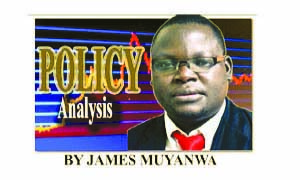AS early as April this year, this forum embarked on a series of articles on manifestos of parties participating in this year’s general elections.
In continuing looking at the economic issues in this year’s general elections, today’s article focuses on salient economic provisions of the Democratic Party (DP) manifesto having looked at a few others before.
On the economy, the DP manifesto is anchored on four pillars which are manufacturing, mining, agriculture and tourism.
If elected, DP presidential candidate Harry Kalaba will seek to resolve the challenges that have ravaged the Zambian economy through the implementation of a sound and accountable mixed economy.
According to the manifesto, this will allow market forces to drive economic activity while taking interventions to support local private enterprises.
This forum has advocated the mixed-economy system before, in addressing Zambia’s economic challenges arguing that pursuing an exclusive single-type economy policy does not work.
DP’s manifesto further states that the key role of the government will be to create a sound regulatory environment that supports private enterprise slanted towards Zambian entrepreneurs and investors.
To re-ignite the Zambian economy the DP government pledges to leverage on the four pillars which have already been alluded to.
Manufacturing
Under this pillar the DP promises to fast track the industrialisation policy implementation and remove regulatory delays to reduce the cost of doing business and enhance the ease of doing business in Zambia.
It states that it will provide incentives for setting up manufacturing companies as well as guarantee the purchase and use of made-in-Zambian products in all government institutions.
The Zambia Bureau of Standards (now the Zambia Compulsory Standards Agency) will be given support to ensure effective monitoring and standardisation of products, to enable them favourably compete on the international market.
“We shall progressively create entry restrictions for non-essential goods to allow for local manufactures to grow and compete favourably on the regional market,” partly reads the DP blueprint.
Mining
According to the DP, while mining has been Zambia’s economic mainstay, the country has not fully benefited from its mineral resources.
It, therefore, pledges to stop the export of raw copper, cobalt, gold and any precious or semi – precious stones being mined in Zambia.
It states that it will ensure to create capacity for processing of all minerals and precious and semi-precious stones to allow the country to benefit from the export of value-added products.
DP pledges to facilitate and create linkages with electric car manufacturers so as to enable Zambian companies to start manufacturing copper components that are a major part in electric cars.
Given the rise in the electric car manufacturing, the copper products will have a ready international market.
Agriculture
The DP says it will not take agriculture as a mere pass time or vocational activity but a viable business.
It will support processing of agriculture produce and through the sector bank, which will be set up, it will facilitate the procurement of tractors and other mechanised implements to help enhance both production and productivity.
Indeed, productivity is one of the major challenges Zambian farmers are currently grappling with, rendering farming not so profitable in the end.
The DP says it will leverage on the Great Lakes Region and other countries within the region as a way of increasing export of agriculture products.
It pledges to also support the use of sustainable farming methods and help small scale farmers in setting up cooperatives through which financing will be provided.
Tourism
The DP notes that Zambia is endowed with many wonders that are yet to be explored and could be money spinners.
The DP government will, therefore, seek to promote both conventional as well as health tourism, taking advantage of the country’s good weather, accessibility and hospitable citizens.
Among the areas of focus in enhancing tourism, DP promises to open up the Northern Circuit which it says boasts of more than 15 waterfalls.
It intends to depoliticise traditional ceremonies and ensure that they are a permanent fixture fixture on the annual calendar.
The DP government through the tourism council will work with international tour operators and the media to help package Zambia through such events as the regatta, fishing competition and white water rafting competition.
These will be marketed in the international media as a way of increasing visibility.
In its five-year term, if elected, the DP projects to grow the economy from the current level of below $25 billion to $45 billion by the end of 2026.
To double the Gross Domestic Product (GDP) in five year, though, looks over ambitious!
In terms of the timeline and some of the activities, the DP pledges to this year address the corruption and engage the country’s lenders.
In 2022, it plans to review existing economic policies and implement new ones alongside the restructuring of the current debt stock.
For 2023 DP states that it intends to create investor confidence, increase government revenue and tackle local manufacturing while in 2024 it wants to enhance citizens’ participation in the economy, reduce imports by 50 per cent and enhance value addition as well as beneficiation.
In 2025 it target to increase exports, only import essential commodities, and create predictable policy while by the end of 2026 it says it will have enhanced transparency, increased revenue and improved lifestyle.
For comments call: 0955 431442, 0977 246099, 0964 742506 or e-mail:
jmuyanwa@gmail.com.







